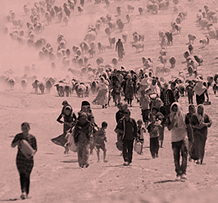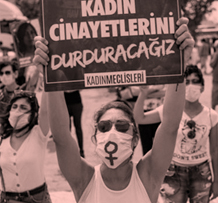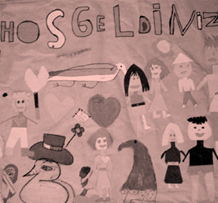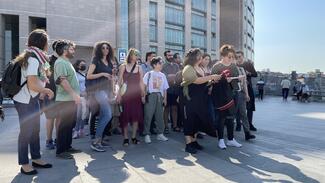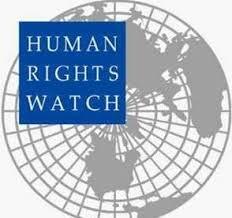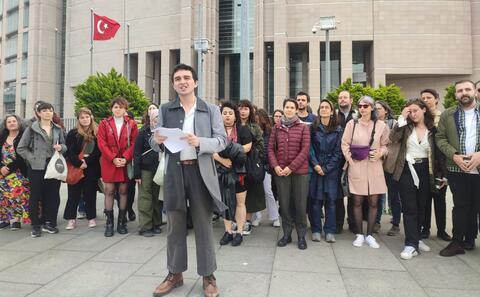
The authorities in Turkey are increasingly using methods of administrative and judicial harassment that can go as far as closing down associations to hinder the critical work of civil society. They particularly target groups in relation to women's rights, LGBTQIA+ rights and the Kurdish question. This is part of an oppressive system put in place in recent years to silence critics, concludes a new report published by the Observatory for the Protection of Human Rights Defenders (FIDH-OMCT) and its partners.
In Turkey, closure cases against associations are used to target individual organisations while exerting a chilling effect over civil society. The Observatory (FIDH-OMCT) and their partner organisations in Turkey, the Human Rights Association (İnsan Hakları Derneği - IHD) and the Human Rights Foundation of Turkey (Türkiye İnsan Hakları Vakfı - HRFT) are releasing today a report documenting this practice and its adverse impact on civil society organisations and the communities they support. The report is released on the eve of the sixth hearing in the closure case against the We Will Stop Femicides Platform (Kadın Cinayetlerini Durduracağız Platformu - KCDP) before an Istanbul Court, a case closely documented in the report.
The report “Uncertain and Eerie”: Closure Cases Against Associations in Turkey reveals a pattern of systematic use of such cases as a tool to crack down on civil society and narrow civic space. It demonstrates that the drastic measure of dissolution of associations is abused by the authorities to silence and sanction associations in retaliation for their work.
A climate of fear among civil society organisations
The report argues that baseless closure cases, along with other forms of harassment – which the Observatory has documented in previous publications –, have become a new tool in the hands of the authorities to stifle and divide civil society in Turkey that is critical of government policies and to delegitimize their work. It documents and analyses closure cases against four associations filed as of 2021: the Religious Scholars Mutual Aid and Solidarity Association (Din Alimleri Yardımlaşma ve Dayanışma Derneği - DİAYDER), the Migration Monitoring Association (Göç İzleme Derneği - GÖÇİZDER), KCDP and the Tarlabaşı Community Centre (Tarlabaşı Toplum Merkezi - TTM).
Based on information gathered by the Observatory, IHD and HRFT in June 2023 and on direct testimonies by representatives of the four associations and the people they support, the report documents the impact of the closure cases on the individual associations, their members and the communities they work with. The report further demonstrates that, regardless of the outcome, being targeted with a closure case is inherently stigmatizing and isolating for associations, which one respondent described as an “uncertain and eerie position.” In a context where dissenting voices are increasingly targeted and civil society organisations are consistently decredibilised and are the subject of attacks by the authorities and by pro-government media, these cases contribute to fuelling a climate of fear among civil society organisations and to undermining their credibility and standing within the society in Turkey.
“It is disgraceful that we are still talking about serious violations of the rights to freedom of association and freedom of expression as the ones described in this report in a country that still pretends to be considered as a candidate for EU accession,” declared Reyhan Yalçındağ, Vice-President of FIDH and IHD representative. “While many NGOs close to the government receive substantial support, those demanding the democratic resolution of the Kurdish issue and independent women’s and LGBTQIA+ rights groups face arrests, closure cases, and other forms of harassment, demonstrating that these are politically motivated and pursue the sole aim of crushing dissent.”
“These kinds of attempts to close associations are unacceptable. These practices must immediately cease in light of universal values. Yet, we trust that civil society in Turkey will be able to overcome these issues thanks to the solidarity expressed by those who support us at the national and international level,” added Metin Bakkalcı, Chairperson of HRFT.
All four associations facing closure cases have also been openly targeted by government officials and/or pro-government media.
“The hostile discourse against civil society that has been documented in our previous reports has reached unprecedented levels, with no effective remedy available to those targeted,” said OMCT Secretary General Gerald Staberock. “Smear campaigns labelling associations as ‘terrorist’ or ‘immoral’ aim to delegitimise the contributions of civil society as part of attempts to stifle democratic debate in Turkey.”
Reprisals against KCDP criticism of government policies
Tomorrow’s hearing in the closure case against KCDP is but one example of this worrying recent trend. The case was filed based only on online complaints against the organisation orchestrated by a member of the ruling Justice and Development Party (Adalet ve Kalkınma Partisi - AKP), and records unlawfully kept by the police about KCDP members. The lack of solid, verified evidence and the source of the complaint highlight the political motives behind the case: to retaliate against KCDP’s criticism of the government’s gender equality policies amidst rising anti-gender narratives and the increased targeting of women and LGBTQIA+ people in Turkey. The court is expected to deliver the judgment in tomorrow’s hearing.
The full report is available in English and Turkish
